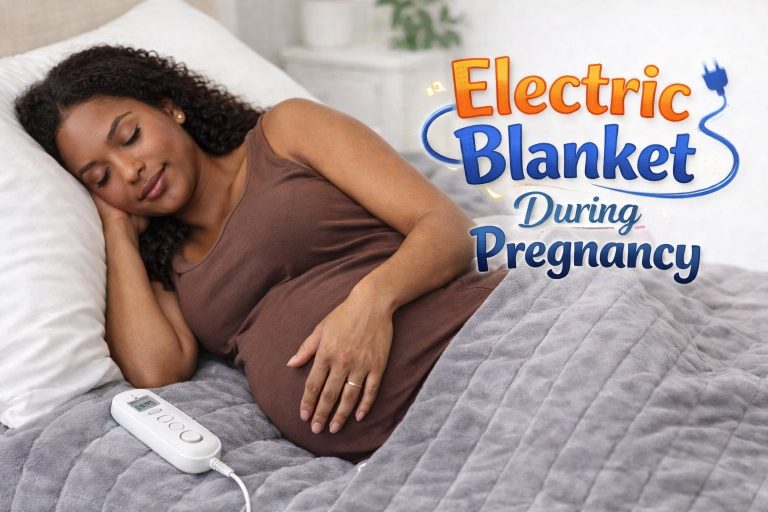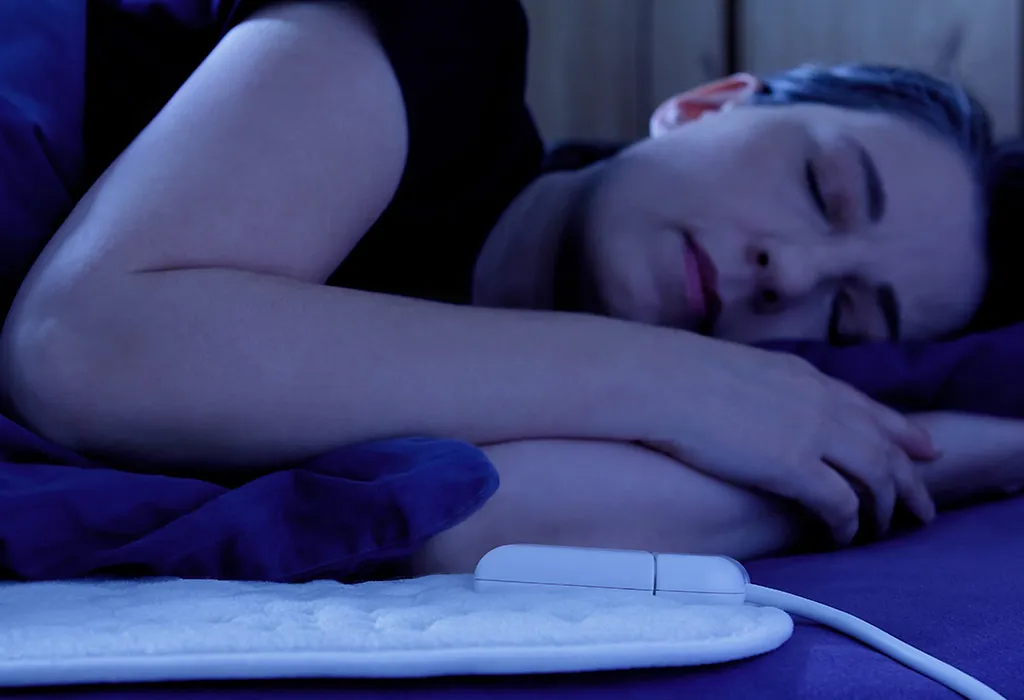Using Electric Blanket During Pregnancy – Is It Safe?
Is it safe to use a electric blanket during pregnancy learn risks safety tips and best ways to stay warm comfortably at night warm

While traditional blankets keep you warm by trapping your body heat, electric blankets use electricity to heat a thin, insulated copper wire inside the blanket before you even get into bed! If on a cold wintery evening, you have heard the phone ringing in the other room and dreaded the idea of having to let go of the blanket, for it will get cold, only to have to wait again, for warmth to build up, then you know exactly why the ‘electric blanket’ was invented and can’t thank it enough for it. But if you are pregnant, you might want to think twice before using it. Understanding the correlation between an electric blanket and pregnancy can help expectant mothers make an informed decision whether to use them or not, as they may elevate the core body temperature. If you want to use an electric blanket in pregnancy to keep yourself warm, consider this post first.
Can You Use a Heated (Electric) Blanket While Pregnant?
Here’s the verdict: It is safe to use an electric blanket while pregnant, as long as the temperature is not too high and there is no continued exposure to heat.
While there’s little risk related to heated blankets during pregnancy, which contain electrical heating wires and can reach high temperatures, exposing your core body temperature to exceed 102°F (38.9°C) can pose a threat to your developing baby (1). If the core body temperature rises above this level for more than 10 minutes, it could cause overheating and increase the risk of miscarriage and dehydration (2). It is, thus, important to avoid using a heated blanket for extended periods or at high heat settings.
Consider your pregnancy progress, any associated conditions, and your overall health, and the baby’s before using electric blankets. Consult your doctor if you have the minutest doubt regarding the use of a heated blanket in pregnancy.
What Makes an Electric Blanket Unsafe for Pregnant Women?
Where there is electricity, there are electromagnetic fields. The adverse effects on the human body from exposure to this invisible field are still being studied. The presence of an electromagnetic field is one of the reasons why mobiles are considered dangerous to keep in your pockets on a long-term basis. The same goes for an electric blanket. It is believed that the overheating of the blanket could affect the baby.
Risks Associated With Using an Electric Blanket While Pregnant
The following are the risks associated with using an electric blanket during pregnancy:
- The higher the settings of an electric blanket, the stronger the EMF it produces. The difference in the strength of the field on low settings and high settings can be up to threefold! This compounds the risk of a miscarriage.
- Using an electric blanket on high settings could potentially lead to a miscarriage; however, it’s not certain. The risk of pregnancy loss slightly increases with the use of electrically heated beds (electric blankets and heated water beds) during pregnancy (3). This risk is highest during the first seven weeks of pregnancy.
- Using an electric blanket on high settings frequently over the course of the pregnancy is linked to low weight in babies at birth.
- Overheating increases the risks associated with the use of electric blankets. The high heat could disrupt the development of the neural tube in the foetus or congenital urinary tract anomalies (CUTAs), especially if exposed during the early stages, like the first trimester (4). This could result in serious conditions such as spina bifida (5).
- Overheating could also make you sweat while you sleep, and may lead to dehydration.
- Faulty wiring or malfunctions in electric blankets can pose a risk of electrical shocks, which may be particularly dangerous during pregnancy and could harm both the mother and the developing baby.
Precautionary Tips for Using an Electric Blanket in Pregnancy
If using an electric blanket, it is recommended that you take these precautions (as they may apply):
- If the weather is not severely cold, it is better to turn off the power after the blanket heats up. Since the blanket will trap your body heat anyway, it will not get cold later on.
- Overheating the blanket can affect foetal development in the first seven weeks of pregnancy, so an electric blanket is best avoided during this time.
- Avoid using an electric blanket towards the last weeks of your pregnancy. In the event of your water breaking, the blanket may get soaked, cause a short-circuit and increase the risk of fire.
- Avoid using the electric blanket if there are visible wires or if the fabric is torn (6).
- Maintain lower temperature settings throughout pregnancy to reduce the chances of overheating and exposure to electromagnetic fields (EMFs).
Alternatives to Electric Blankets
It is not advisable to use an electric blanket during pregnancy as there are enough and more risks associated with the use of electric blankets in pregnancy, especially in early pregnancy and during the first two and last months of your pregnancy, and for the most part, when the blanket is in high settings. It’s best that you consider alternatives to electric blankets. Some of the alternatives you can consider are:
- Use a hot water bottle to heat up the inside of the blanket.
- The modern-day alternative to a hot water bottle is a heating pad. Heating pads are long, soft, and pliable, allowing you to wrap them around your neck or body. All you need to do is microwave it to heat it up, and you are ready to go (7)!
- Layering up is another way to go! Put on a warming nightcap, socks, and thermal innerwear, and add layers to your outerwear to keep yourself warm and cosy.
- Consider using microwavable rice bags or wheat bags as a safe and effective alternative to electric blankets. These can provide targeted warmth and are easy to use by heating them in the microwave.
FAQs
1. Are there any electric blankets made specially for expectant mothers?
Some manufacturers offer electric blankets designed with safety features specifically for expectant mothers. These blankets may have lower heat settings and EMF levels to minimise risks.
2. Is it safe to use an electric blanket on the abdomen while pregnant?
It’s generally not recommended to use an electric blanket directly on the abdomen during pregnancy, especially in high settings. This practice can pose risks related to overheating and potential exposure to electromagnetic fields (EMFs). A 2009 study found that maternal occupational exposure to extremely low frequency magnetic fields (ELF-MF) shortly before and during pregnancy may cause certain brain tumours in their offspring (8).
3. Is it okay to use heated mattress pads instead of electric blankets during pregnancy?
Heated mattress pads are considered a safer alternative to electric blankets during pregnancy. They provide consistent warmth without the potential risks associated with the elevated settings of some electric blankets.
4. How can you clean an electric blanket when pregnant?
Follow the manufacturer’s cleaning instructions provided with the electric blanket. In many cases, it’s recommended to detach the controller, spot-clean any stains, and either hand-wash or machine-wash the blanket on a gentle cycle. Always ensure the blanket is completely dry before use to prevent electrical issues.
5. What are some ways to warm my room without using an electric blanket?
To maintain warmth in a room without an electric blanket, consider improving insulation, fixing drafty windows and doors, utilising heavy curtains, incorporating rugs, and employing a space heater. Dress in warm attire and use a hot water bottle for additional heat.
6. Are electric blankets energy-intensive?
Electric blankets generate heat through integrated wires and consume a moderate amount of electricity.
In addition to these alternatives and precautions, manufacturers of electric blankets have raised concerns about the effects of EMF and have developed blankets with very low or no magnetic fields. But it’s best that you avoid using any kind of electric blankets during pregnancy. If you want to keep yourself warm, wear thermal wear and layer up as much as it’s comfortable for you and your baby. So this was all about heated blankets and pregnancy.
Also Read:
Hot Water Bath during Pregnancy
Using Heating Pad in Pregnancy
How Safe is to Have Spa in Pregnancy?
Using Massage Chairs during Pregnancy
Was This Article Helpful?
Parenting is a huge responsibility, for you as a caregiver, but also for us as a parenting content platform. We understand that and take our responsibility of creating credible content seriously. FirstCry Parenting articles are written and published only after extensive research using factually sound references to deliver quality content that is accurate, validated by experts, and completely reliable. To understand how we go about creating content that is credible, read our editorial policy here.




































